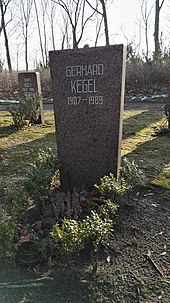Gerhard Kegel (diplomat)
Gerhard Kegel (born November 16, 1907 in Preussisch-Herby , Lublinitz district , Upper Silesia , † November 16, 1989 in Berlin ) was a candidate for the Central Committee of the SED and a diplomat of the GDR.
Life
Kegel was born the son of a railroad worker. After attending secondary schools in Katowice , Opole and Breslau , he graduated from high school in 1926 and then completed an apprenticeship as a banker. From 1928 to 1931 he studied law and was a co-founder of the Socialist Student Union at the University of Wroclaw during this time .
From 1931 to 1932 Cone worked as court clerk at the District Court in Bolkow active and completed in parallel, a journalism training at the Breslauer Latest News , for which he worked from 1932 to 1935 as a foreign correspondent. Around this time he came into contact with Rudolf Herrnstadt and in November 1931 became a member of the KPD . In 1932 he was active in the KPD district leadership in Breslau. In October 1933 he went to Warsaw with Lothar Bolz . In addition to his work as a foreign correspondent, Kegel became an agent of the military intelligence service GRU with the code name Kurt .
Kegel joined the NSDAP on May 1, 1934 to camouflage his work as an agent for the GRU . From 1935 to 1939 Kegel was an assistant scientist in the trade policy department of the German embassy in Warsaw and from 1939 to 1941 deputy head of the trade policy department of the German embassy in Moscow . From 1941 to 1943 he worked in the Foreign Ministry, where he was in contact with Ilse Stöbe and Rudolf von Scheliha . In 1941 he was promoted to legation secretary in the Foreign Office by Adolf Hitler . According to Simon Wiesenthal , head of the Jewish Documentation Center in Vienna, Kegel worked for the Gestapo . In 1943 he was drafted into the Wehrmacht as a sergeant and interpreter . In 1945 he deserted to the Red Army . From January to March 1945 he was imprisoned in Soviet captivity in Poland and in Moscow in the Lubyanka . Afterwards he worked for the National Committee Free Germany .
In June 1945 he returned to Berlin and was deputy editor-in-chief of the Berliner Zeitung until 1949 and from April 1949, as successor to Rudolf Herrnstadt, editor-in-chief and head of the Berliner Verlag . In 1949, Kegel was briefly personal advisor to Wilhelm Pieck .
In 1946 he became a member of the SED . From 1949 to 1950 he was Head of Office in the Ministry of Foreign Affairs of the GDR in the Political Affairs Department .
1950 to 1951 he was deputy editor-in-chief of the SED central organ Neues Deutschland , from 1951 to 1954 director of the publishing house “Die Wirtschaft” and editor-in-chief of the magazine of the same name. From 1955 to 1972, Kegel was a senior member of the SED Central Committee responsible for foreign policy and foreign policy advisor to Walter Ulbricht . In 1959 he took part as envoy at the Geneva conference of foreign ministers of the great powers. From 1967 to 1971 he was a candidate for the Central Committee of the SED, from 1973 to 1976 ambassador and head of the GDR's permanent mission to the UN in Geneva .
His urn was in the grave conditioning Pergolenweg the memorial of the socialists at the Berlin Central Cemetery Friedrichsfelde buried.
Fonts
- Notes from a great trip . Berlin 1964.
- A quarter of a century later . Berlin 1970.
- In the storms of our century . Berlin 1984.
literature
- Irina Liebmann : Would it be nice? It would be nice! My father Rudolf Herrnstadt. Berlin Verlag, Berlin 2008, ISBN 978-3-8270-0589-2 .
- Gert Rosiejka: The Red Chapel. "Treason" as an anti-fascist resistance. Results Verlag, Hamburg 1986, ISBN 3-925622-16-0 .
- Bernd-Rainer Barth , Helmut Müller-Enbergs : Kegel, Gerhard . In: Who was who in the GDR? 5th edition. Volume 1. Ch. Links, Berlin 2010, ISBN 978-3-86153-561-4 .
- Olaf Kappelt : Brown Book GDR. Nazis in the GDR. Reichmann, Berlin 1981, ISBN 3-923137-00-1 .
- Maria Keipert (Red.): Biographical Handbook of the German Foreign Service 1871–1945. Published by the Foreign Office, Historical Service. Volume 2: Gerhard Keiper, Martin Kröger: G – K. Schöningh, Paderborn et al. 2005, ISBN 3-506-71841-X .
- Helmut Müller-Enbergs: National Committee Free Germany. In: Gerd R. Ueberschär : The National Committee "Free Germany" and the Association of German Officers. Fischer-Verlag: Frankfurt am Main 1995, ISBN 3-596-12633-9 .
Web links
- Literature by and about Gerhard Kegel in the catalog of the German National Library
Individual evidence
- ^ Olaf Kappelt: Brown Book GDR. Nazis in the GDR . Reichmann Verlag, Berlin (West) 1981. ISBN 3-923137-00-1
| personal data | |
|---|---|
| SURNAME | Kegel, Gerhard |
| BRIEF DESCRIPTION | German diplomat of the GDR |
| DATE OF BIRTH | November 16, 1907 |
| PLACE OF BIRTH | Prussian Herby |
| DATE OF DEATH | November 16, 1989 |
| Place of death | Berlin |

